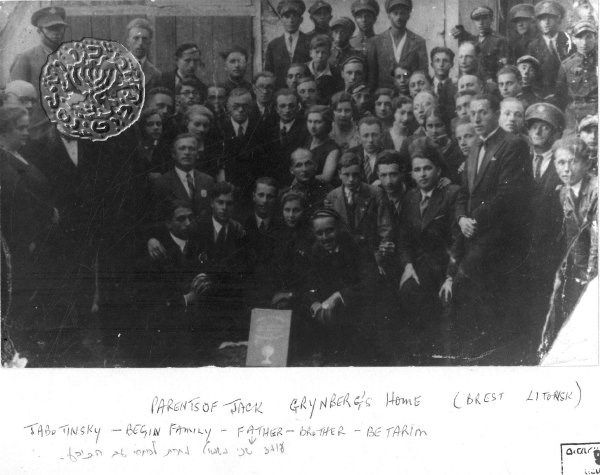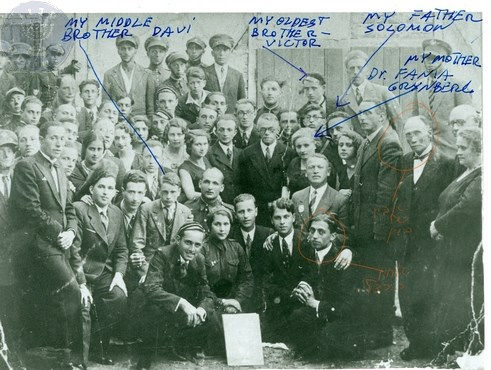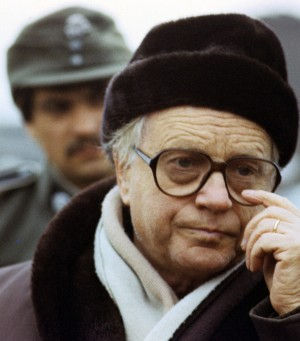He made films about what he was familiar with – Israel, the Holocaust and all-conquering love. But his greatest success was brought to him by a painting based on the events of his own life – the story of his escape from the Soviet Union to Eretz Israel during the Second World War.
The future film director, producer and writer DAVID GRINBERG (who later took the pseudonym ALEXANDER RAMATI) was born on December 20, 1921 in Brest-Litovsk. The Grinbergs belonged to the revisionist Zionist circle. Their names did not go down in history, like the names of Begin and Zhabotinskiy – their close friends and comrades, but at one time everyone knew them in the circle of right-wing Zionists. Wolf Begin, the father of the future Prime Minister of Israel Menachem Begin, was the teacher of David Grinberg and his brothers. Menachem often visited the Grinbergs and played chess with David.
Parents paid great attention to the education and development of children. Already at the age of 9, David Grinberg became the main Brest correspondent for Maloye Obozreniye, a Polish weekly for children published by Janusz Korczak. Several times a year David traveled by train from Brest-Litovsk to Warsaw to see the editor-in-chief. Working on Korczak's editorial board had a huge impact on the young Greenberg. Subsequently, he admitted that it was then that he decided to become a writer.
In 1939, on the eve of the German invasion of Poland, David passed the exams for the Faculty of Law at the University of Warsaw. But he did not have time to start his studies: Poland was divided between Germany and the Soviet Union. Warsaw was in the hands of the Germans, and the Russians came to his hometown. The Grinberg family was a class enemy for the new government. The Soviets almost immediately nationalized the family pharmacy business and relocated the Grinbergs to Kovel, where they lived awaiting arrest. The departure to Palestine, planned by the head of the family, was postponed indefinitely.
On June 22, 1941, the elder brother Avigdor suggested David run deep into Soviet territory, get to Central Asia and try to cross the border with Iran there. And from Iran to Palestine is already a stone's throw. The brothers managed to get to Ashgabat. Here it was necessary to prepare for the border crossing. Finally, everything was ready to escape. But a few days before the set date, familiar Poles tried to cross the border with Iran – they were caught and sent to Siberia. Fearing the same fate, the Grinbergs decided to change the plan of action. At that time, the center of the Polish Army of Anders was located in Central Asia, which was formed from Polish citizens who found themselves on the territory of the Soviet Union. Among the soldiers were refugees, interned members of the Polish army and amnestied prisoners. The army was led by the Polish general Anders.
In the early spring of 1942, the Poles managed to reach an agreement with the Soviets. Anders' Army soon left the territory of the Soviet Union. Avigdor and David Grinbergs marched in the ranks of Polish soldiers towards Iraq. On the way, the brothers had to split up – Avigdor fell ill with typhus. After some time, David received a letter with an army seal announcing his death. However, while with his regiment in the Iraqi city of Khanaqin, David saw a Polish soldier descending from the hill with a very familiar gait. Fortunately, there was no limit – Avigdor survived and was back in the ranks.
In July 1943, Anders' Army was reformed and became the Second Polish Corps in the British Army. At the end of the same year, the unit in which the Grinbergs served was transferred to Palestine. There Avigdor, who had never left after an illness, was demobilized. He was not alone – about 3 thousand Jews who served in the army remained in the Land of Israel. And David, along with the entire Polish corps, was sent to the Italian front in January 1944.
At this time, David seriously took up military journalism. Under the pseudonyms Alexander Ramati, Ludwik Brestsky, LB and Julian Kritsky, he wrote for Polish and Palestinian newspapers and magazines, as well as for the American weekly Time. It turned out that David has the gift of a polyglot - in a matter of months he learned English, Italian and mastered Hebrew. During his service, he also managed to publish two books: “Khvedkovitskiy Forest” in 1944 and “Silent Army” in 1945. In 1946, “Silent Army”, published in Italian, won a prestigious book award in Italy.
In 1945, David ended up in Scotland. There he received news that his parents and younger brother were alive: throughout the war they hid with the Belarusian peasants, and after the retreat of the fascists they returned to Brest. David helped them to go to him in Scotland, and in 1946 – to move with him to Tel Aviv.
The war made Grinberg a convinced pacifist. In the Land of Israel, David Grinberg did not join the military Zionist organizations. His main weapon was the word. Journalist Alexander Ramati did not disappear, he found a new topic. Now he wrote not about military operations, but about the young state of Israel. His articles were published in American newspapers. He created what would now be called a positive image of the state – and this was no less important than defending Israel with arms in hand.
In 1949, in Tel Aviv, David met the miracle survivor of the Holocaust Gerda Sonnenfeld. They got married in 1950 in the Netherlands and began to think about how to live on. Both were interested in journalism and theater, but most of all in cinema! They dreamed of setting up filmmaking in Israel, but it was impossible to get a director's education here. In the early 1950s, wanting to continue his studies, Grinberg went to the United States, where he entered the University of California. After graduation, he began to work in Hollywood under the name Alexander Ramati. His wife Gerda Grinberg also changed her name to Didi Ramati.
Alexander Ramati tried his hand at the theater. In 1956, his play “Survival” was a success in Los Angeles. The play told about the events that happened to the author's family during the war in Belarus, and how his parents and younger brother managed to survive thanks to the resilience and wisdom of his mother, Fani Abramovna. In 1958 Ramati's autobiographical book Beyond the Mountains was published in London about his escape from the Soviet Union.
Once at the Paramount studio, Alexander Ramati met the famous American director Elia Kazan. He brought him to work at the Columbia Broadcasting System-television. After working there for several years and gaining experience, Ramati in 1964 founded his own film company and production center “David Films and David Productions”.
The main theme of Alexander Ramati's work was Israel. Despite a successful career in Hollywood, he never forgot about his homeland. In 1964, Ramati wrote and directed the film The Sands of Beer Sheva, which took place against the backdrop of the Israeli War of Independence.
One of the main films of Ramati was the film adaptation of his autobiographical novel about the escape from the Soviet Union. In Russia, this film was released after perestroika under the title Desperate Loners. For the script, the author of the picture changed some details of the plot, for example, made the main characters not Jews, but Poles. According to Ramati, this was a prerequisite for a successful worldwide release. He considered that the story of the flight of Jews to Palestine would not interest a wide audience. The film was a great success in the USA and Europe.
In 1965, Ramati wrote a screenplay about his childhood friend Janusz Korczak, commissioned by West German producer Artur Brauner. Two countries took part in the work on the picture: Germany and Poland, but in 1968 the film company “Film Polski” canceled the contract. The official reason was the delay in timing. The real one is the anti-Semitic campaign launched in Poland in 1968. Polish functionals remembered not only Korczak's Jewish origins, but also his skepticism about the idea of communism.
Artur Brauner and Ramati decided to cope on their own. The film was directed by Alexander Ford, recently expelled from Poland, the author of the famous film “The Crusaders” based on the novel by Sienkiewicz. “They Will Be Free, Dr. Korczak” was released in April 1975. Ramati paid tribute to the memory of his teacher and friend.
By that time, Ramati had already lived in Israel for three years. He taught cinema at Tel Aviv University and shot a film about his brother Yakov, who survived in occupied Belarus – but for some unknown reason the film was not released. And Ramati, once again faced with the impossibility of filming at home, in 1981 left for Switzerland.
David Grinberg, aka Alexander Ramati, died in Switzerland on February 18, 2006 at the age of 86. His life's work – cinema – was continued in the family. His nephew Stephen also took up filmmaking. Now he is making a film about his family and the Holocaust.
Alexander Ramati
1921 – 2006







